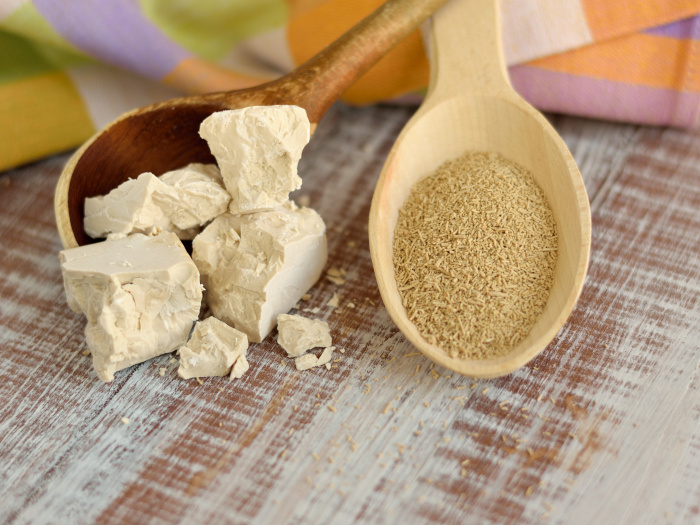Yeast extract is a broad term for any yeast products made by removing the cell wall from the yeast and applying the result as a food additive, for the beer-making process, or as a nutritional supplement.
What is Yeast Extract?
Yeast extract is an artificially produced fermented product, typically in the form of a dark brown paste, included in many foods as a flavor additive or nutrient booster. At its most basic level, it consists of the cell contents of a yeast cell, but without the cell wall. Yeast extract can provide a strong umami flavor to foods, and is produced in a liquid form, which can then be dried to a powder, or turned into a paste. Many foods will contain this extract as a flavoring ingredient, though some foods (i.e., Marmite or Vegemite) are primarily composed of this extract. [1]

Yeast extract is an artificially produced fermented product. Photo Credit: Shutterstock
Is Yeast Extract Gluten-Free?
Manufacturers of foods that contain yeast extract are not required to disclose the source of their yeast. In other words, if the yeast had been used in the brewing process, it may have been contaminated by the presence of malt or grain. As such, it could contain high enough levels of gluten to affect those who have Celiac disease or are extremely sensitive. Not all yeast extract will come from the brewing process, however, so some varieties of this extract are safe. Be sure to check with the manufacturer directly, or only purchase extracts that are clearly marked gluten-free. [2] [3]
Nutrition
First and foremost, yeast extract is high in free glutamates, which are different forms of glutamic acid (an amino acid) that add to the flavor profile of this particular food. Yeast is also quite high B vitamins and sodium. A very small amount of yeast extract is typically used in recipes, so a serving size of 1 teaspoon delivers roughly 11 calories, less than 0.5 of a gram of fiber, and approximately 2% of your protein requirement for the day. Low levels of iron, magnesium, potassium, chromium, zinc, and selenium may also be found in this extract, along with trace levels of other minerals.
Remember, nutritional yeast, which is grown and intentionally used as a food ingredient, will be higher in many nutrient categories; yeast extract is primarily a flavoring ingredient, and should be thought of as a spice. That being said, when extract products (such as Marmite and Vegemite) are consumed, you need to pay more attention to the nutritional details per serving. [4]
Is Yeast Extract Good For You?
Yeast extract has a number of potential benefits, when consumed in moderation, such as boosting energy levels, nervous system function, metabolic activities, eyesight, and the production of red blood cells, among others. These benefits are almost solely derived from high levels of B vitamins, such as riboflavin, thiamine, and folate, as shown in this article from the Journal of Food Composition and Analysis. It is difficult to argue that this extract is good for you in a wide variety of ways, but it can certainly make your food more enjoyable (that’s what glutamates do in the brain) and has certain components that are linked to better health. [5] [6]
Side Effects
Many people choose to avoid glutamates, such as MSG, and yeast extract is high in these components. There have been some reports of flushed skin and headaches as a result of consuming this extract, but the negligible amount found in most foods should have little to no effect. If you are trying to eat a completely raw diet, or do have an allergy to glutamates or yeast products, you should avoid foods that utilize yeast extract. If you have a gluten intolerance or celiac disease, be sure to check with the manufacturer before consuming, as some extracts are derived from yeast that has been used in the brewing process. Finally, these products shouldn’t be consumed with MAO inhibitors, as it could lead to elevated blood pressure. [7]
